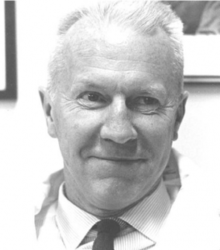William Bennett Bean
William Bennett Bean (November 8, 1909, the Philippines – March 1, 1989) was a well-known internist, medical historian and teacher.

He was born in the Philippine Islands, but not long after the family moved to New Orleans and a few years later to Charlottesville, Virginia, where his father became chairman of the Department of Anatomy at the University of Virginia. He received his B.A. and M.D. from the University of Virginia, in 1932 and 1935, respectively. Following graduation from medical school, with top of the class designation and as president of Alpha Omega Alpha, he interned on the Osler Service at Johns Hopkins University. The following year he moved to Boston and joined the elite group at the Thorndike Laboratory and the Harvard Service at Boston City Hospital. Dr. Bean began his clinical career at the University of Cincinnati College of Medicine (1936–1946) and at Cincinnati General Hospital (1941–1948). He was both a teacher and clinician, specializing in nutrition. He left Ohio in 1948 to become professor of medicine and head of internal medicine at the University of Iowa College of Medicine. He was named Sir William Osler Professor of Medicine there in 1970. In 1974, Dr. Bean was appointed Director, Institute for Medical Humanities and Professor of Internal Medicine at the University of Texas Medical Branch, Galveston. In 1980, he retired from the Institute and returned to Iowa City as Sir William Osler Professor Emeritus.
Legacy
Throughout his career, Dr. Bean was well known for his expertise in the field of nutrition, but even more so for his teaching and writing excellence. Long an admirer and follower of Sir William Osler's philosophies and techniques, Dr. Bean rarely turned down an invitation to speak or be a visiting professor. In his 1974 Archives of Internal Medicine festschrift, he was described as
- "a true renaissance man: an articulate clinician, a scholar of the classics, a masterful teller of tales, and a prodigious writer of stories."
Awarded Fellowship, American Medical Writers Association in 1958 (Fellowships presented to members of AMWA to recognize significant contributions to the goals and activities of AMWA and professional accomplishments that have been recognized by their peers.)
Awarded Swanberg Distinguished Service Award, American Medical Writers Association in 1969. (Swanberg Award presented to any active member of AMWA who has made distinguished contributions to medical communication or rendered unusual and distinguished services to the medical profession.)
Between 1937 and 1974, Bean published over 600 works in such diverse fields as nutrition, respiratory disease, myocardial infarction, climatology, arterial "spiders," slum eradication and housing, liver disease, William Osler, Walter Reed, and the history of medicine. For over thirty years, Bean served as editor for fifteen journals, most notably the Archives of Internal Medicine. In 1970, he co-founded the American Osler Society. He also was selected by two different Presidents to serve on the National Library of Medicine's Board of Regents. His papers are held at the Osler Library of the History of Medicine at McGill University[1]
Selected works
- Bean, William B., Walter Reed: A Biography, Charlottesville: University Press of Virginia, 1982.
- Bean, William B., “Walter Reed and Yellow Fever,” JAMA 250.5 (5 August 1983): 659-62.
References
- "William B. Bean Fonds". McGill Archival Collection Catalogue. Retrieved 25 February 2019.
This article contains public domain text from the U.S. National Library of Medicine